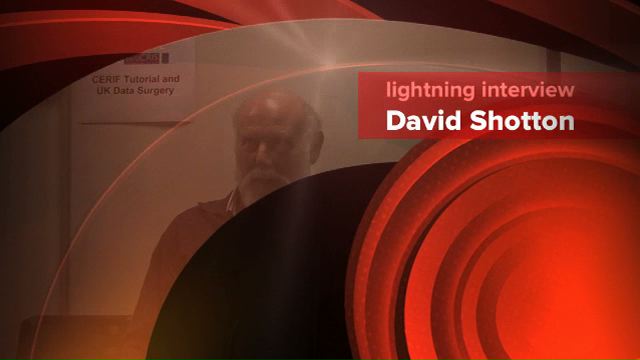Interviews with Innovators: David Shotton
Extending semantic publishing to enrich research literature and research data
David Shotton (University of Oxford) discusses work extending semantic publishing to enrich research literature and research data. Recorded at a EuroCRIS workshop, this interview calls attention to developments to enrich research communications, including machine-readable metadata with “links to related data resources and mashups with other data that’s available on the Web”.
Conducted in support of the JISC Observatory and as part of our Interviews with Innovators series, this interview is available in video as well as audio format. See below our interview transcript.
David Shotton (University Emeritus Reader and Emeritus Fellow of Wolfson College) is based in University of Oxford’s Department of Zoology and leads the Image Bioinformatics Research Group (IBRG), which is dedicated to research and the development of best practice for the sharing and reuse of biological research data (particularly images). Current interests and R&D activities include developing services for managing research data (DataFlow Project) and work in semantic publishing (developing exemplar articles and the SPAR Ontologies for describing all aspects of publishing, bibliographic entities and citations). Recent developments include creation of the Open Citation Corpus (containing the bibliographic citations from the reference lists in all the Open Access articles within PubMed Central) and MIIDI (Minimal Information standard for reporting an Infectious Disease Investigation). For more information, see: http://www.zoo.ox.ac.uk/people/view/shotton_dm.htm
Transcript: Lightning interview with David Shotton
My name is David Shotton and I work in the Zoology Department of the University of Oxford. I am a lapsed cell biologist and I spend all my time these data trying to get biological data onto the web but one of my other key interests is in semantic publishing: how we can enrich the literature.
Q: Which recent innovation in technology most interests you and do you consider this important?
Well the things that have been involving me most over the last little while have been developing ontologies for this semantic publishing domain and then extending those to cover research data and, most recently, data management plans so that the whole area of research endeavour can be described in machine-readable metadata.
Q: Where have you seen promising developments related to this?
One of the nicest things over the last year has been a series of meetings that have surrounded the future of research communication, which has brought together technologists and researchers and publishers and other interested parties. This culminated in the publication of the Force11 white paper last October and was sent to the UK government and to the Royal Society to inform their data collection activities.
Q: What do you see as the ultimate benefits?
Well what we are trying to work towards is research communications that are more expressive than the static PDF, which just replicates the printed page, so there would be user interactivity and there would be links to related data resources and mashups with other data that’s available on the Web and all sorts of things like that.
Q: And does this very much rely on openness?
Yes, another thing is the increasing openness for research publications but also for data sets and improved links between datasets and publications. Just so people can find their way around research outputs more easily and that datasets can be more easily reused. This helps get more value out of the research that was commissioned in the first place.
Q: If you could wave a magic wand, what obstacles would you remove?
Well I would remove the copyright barrier to text-mining of published journal articles. And I was very encouraged by the fact that someone from Oxford University Press phoned me very recently saying they had read the Force11 white paper and would like me to address them to discuss how they should change their working practices. That would be one of the things I would like them to consider: make their open access journals truly open, with the content to be re-used and not just read, and to make their literature citations open so they could be integrated with other peoples’ literature citations and things like that.
For more discussions of technical innovation in Higher and Further Education, see our Interviews with innovators and our complete list of podcasts available from UKOLN Innovation Support Centre.
Subscribe to our podcast feed to hear the latest from innovators discussing technical developments relevant to Higher and Further Education.






